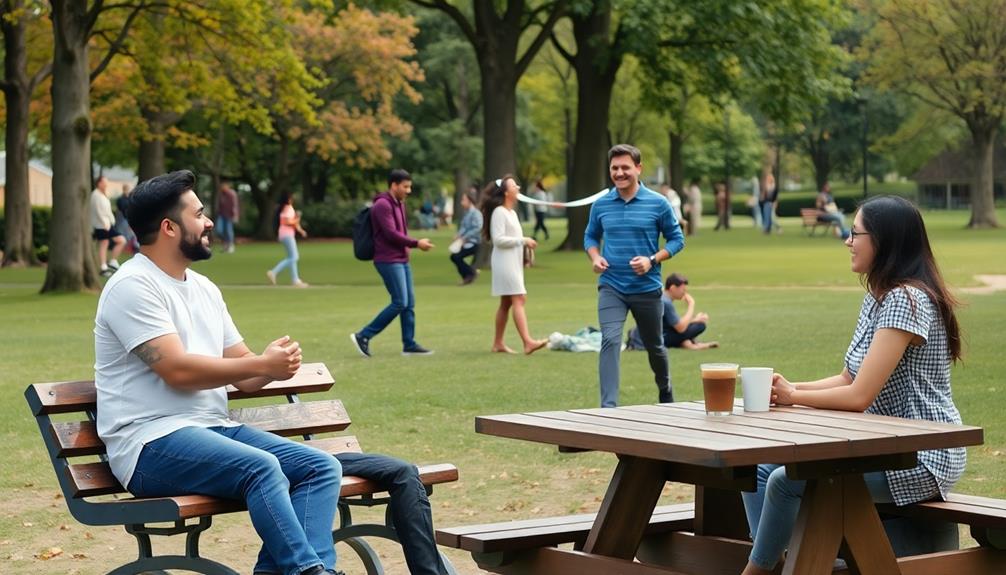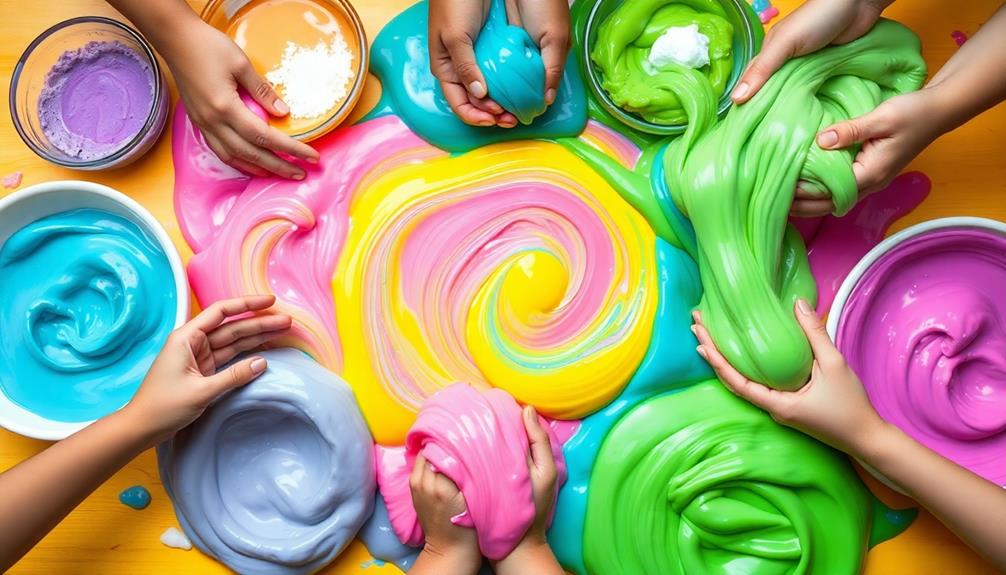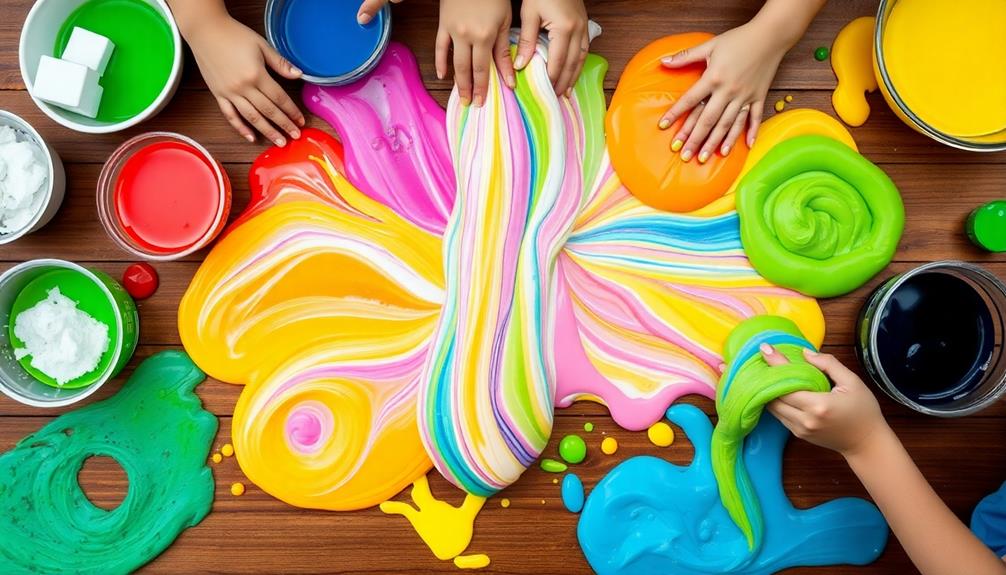Making friends easily starts with knowing where to meet new people. Join local groups or take classes that match your interests. Volunteering can also connect you with like-minded individuals. When you meet someone new, use open-ended questions to spark engaging conversations and practice active listening for deeper connections. Be genuine and authentic; people appreciate sincerity. Don't forget to follow up to strengthen those budding friendships. Regular check-ins can maintain your connections over time. If you're looking to enhance your social skills further, there's plenty more to explore in nurturing friendships.
Key Takeaways
- Join local groups, classes, or volunteer opportunities to meet people with similar interests and values in your community.
- Utilize online platforms like Meetup or Bumble BFF to find and connect with potential friends who share your hobbies.
- Start conversations using open-ended questions and practice active listening to foster deeper connections and mutual understanding.
- Schedule regular check-ins and celebrate milestones to maintain and strengthen friendships over time.
- Acknowledge feelings of loneliness and participate in community activities to build connections and enhance your emotional well-being.
Where to Meet New People
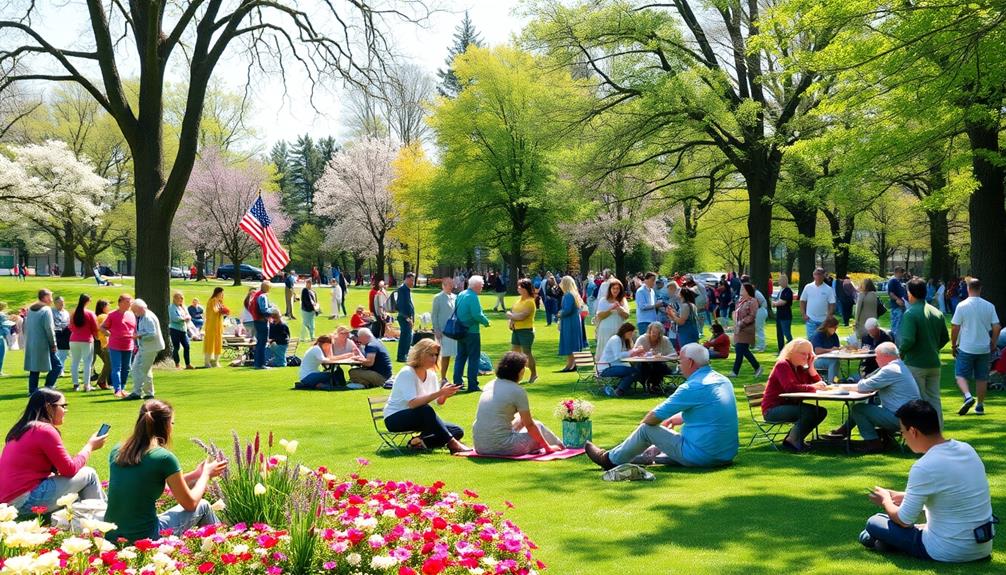
Meeting new people can be easier than you think, especially when you know where to look. Start by exploring local groups that align with your interests. Joining a book club or a sports league gives you a structured environment to connect with others who share your passions.
Engaging in these activities can foster a sense of community, as you benefit from the power of online communities that extend beyond physical interactions. Community centers are also fantastic places to meet people; they often offer classes in dance, art, or languages that encourage social interaction.
Volunteering is another great way to forge new friendships. By giving your time to community organizations like shelters or hospitals, you'll find yourself surrounded by individuals who share your commitment to service. This shared purpose can spark meaningful connections.
Don't overlook the power of attending local events, such as fairs, concerts, or art shows. These gatherings create a relaxed atmosphere where casual encounters can lead to lasting friendships.
Additionally, frequent visits to neighborhood coffee shops or community hubs can help you become familiar with local patrons, opening up opportunities for casual conversations.
Online Platforms for Friendships
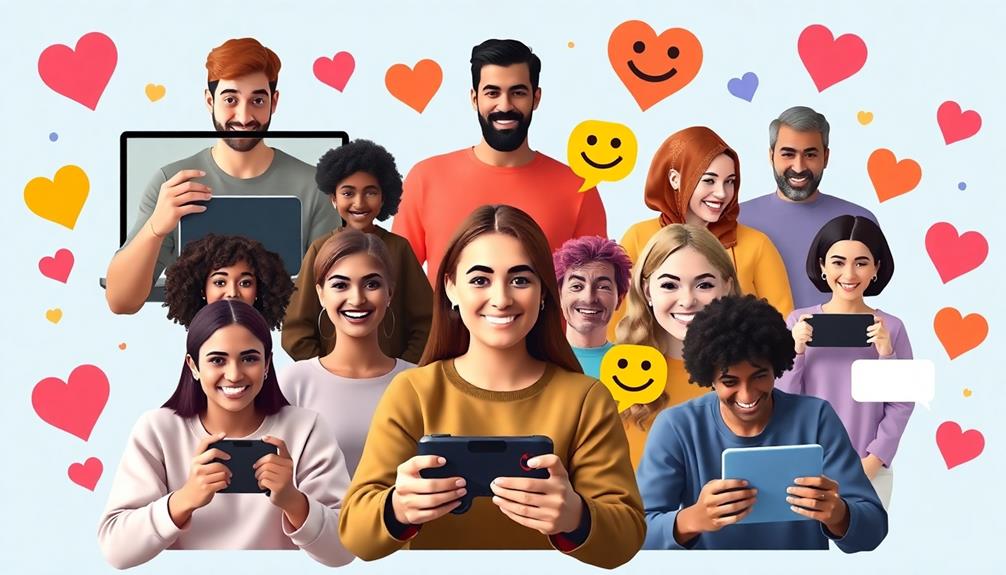
When you're looking to make friends online, choosing the right platform can make all the difference.
Whether you prefer interest-based sites like Meetup or gaming communities, each option offers unique ways to connect.
Focus on building genuine connections by engaging consistently and sharing your passions with others.
Choosing the Right Platform
In today's digital age, choosing the right platform to make friends can greatly enhance your chances of forming meaningful connections. With so many online platforms available, it's crucial to select one that aligns with your interests and goals. Here's a quick guide to help you:
| Platform | Best For |
|---|---|
| Meetup | Meeting new people in local activities |
| Bumble BFF | Finding friends with similar interests |
| Facebook Groups | Engaging with communities around hobbies |
| Discord/Steam | Connecting through shared gaming experiences |
| Skillshare/Coursera | Learning new skills while meeting others |
Using social media effectively can facilitate friendships, especially when you join groups or communities centered around your passions. If you enjoy gaming, platforms like Discord and Steam allow you to meet new people based on shared interests in video games. Alternatively, online forums like Reddit can lead you to individuals who share similar topics of interest. Finally, consider participating in virtual classes, which not only help you learn but also provide opportunities to connect with others. Choose wisely, and you're on your way to meaningful friendships!
Building Genuine Connections
Choosing the right platform sets the stage for building genuine connections. Online spaces like Meetup, Bumble BFF, and Facebook groups allow you to meet people who share similar interests and hobbies.
Engaging in forums on Reddit or joining online gaming communities can also lead to meaningful interactions. These platforms not only help you find friends but also provide conversation starters to break the ice.
Here are some tips to enhance your online friendship experience:
- Explore diverse platforms: Use various sites to find the right fit for your interests.
- Participate actively: Engage in discussions or gaming sessions to bond with others.
- Utilize features: Take advantage of icebreaker questions and interest tags to spark conversations.
- Stay in touch: Once you've made a connection, don't hesitate to reach out through direct messages or group chats.
Initiating Conversations

When you start a conversation, try using open-ended questions to spark engaging dialogue.
For instance, discussing topics like seniors texting humor can lighten the mood and create a connection. Sharing a personal anecdote can make the exchange feel more relatable and build trust.
Don't forget to practice active listening; nodding and maintaining eye contact shows you care about what the other person has to say.
Use Open-Ended Questions
Engaging someone with open-ended questions can spark lively conversations and foster genuine connections. These questions encourage longer responses, allowing others to share more about themselves and helping you connect with people on a deeper level. Instead of simple yes or no answers, you invite elaboration, which can lead to more meaningful discussions that strengthen friendship.
Here are some effective open-ended questions to get started:
- "What do you enjoy most about your job?"
- "How did you get into your favorite hobby?"
- "What's a memorable trip you've taken, and what made it special?"
- "If you could learn any new skill, what would it be and why?"
Using open-ended questions reduces the pressure of conversation by shifting the focus onto the other person, making them feel valued and heard.
Research shows that engaging in these meaningful conversations can considerably increase feelings of closeness and rapport. As you practice this technique, you'll enhance your conversational skills, making it easier to navigate social situations and build lasting friendships over time.
Share Personal Anecdotes
Sharing personal anecdotes can be a fantastic way to initiate conversations and create connections. When you share a light-hearted or relatable story, it often breaks the ice, making others feel comfortable enough to open up and share their own experiences. Aim for moments that evoke laughter or warmth; these tend to create a positive atmosphere.
As you recount your anecdotes, consider using open-ended questions related to your story. This invites deeper discussions, allowing the conversation to flow naturally. For instance, if you share a funny travel mishap, you might ask, "Have you ever had a trip go hilariously wrong?" This not only engages the other person but also fosters a sense of connection.
Authenticity is key in these interactions. Make sure your anecdotes reflect your true self, as genuine stories resonate more with others.
Practice Active Listening
Active listening is a powerful tool that can transform your conversations and help you make friends more easily. By making a conscious effort to engage fully with your conversation partner, you become a good listener, fostering deeper connections.
Here's how to practice active listening effectively:
- Concentrate on the speaker: Put away distractions and focus entirely on what they're saying.
- Use follow-up questions: After someone shares a thought, ask questions that encourage them to elaborate, keeping the conversation going.
- Employ non-verbal cues: Nod and maintain eye contact to show you're engaged and empathetic.
- Reflect back their thoughts: Paraphrasing what they've said can validate their feelings and deepen the exchange.
Building Genuine Connections

Building genuine connections starts with authenticity; people naturally gravitate toward those who are true to themselves. When you're honest about who you are, others feel comfortable being themselves around you. This creates a solid foundation for friendship.
Engaging in shared activities or hobbies can further strengthen these bonds. Whether it's a book club or a sports team, common interests lead to deeper conversations and connections.
Active listening is key in this process. When you listen attentively, you show that you value what the other person is saying. This respect encourages them to open up and share more about their thoughts and feelings.
Additionally, demonstrating empathy helps you understand their experiences better, fostering trust between you. When people feel understood, they're more likely to connect on a deeper level.
Maintaining Friendships Effectively

To maintain friendships effectively, you should schedule regular check-ins and celebrate milestones together.
Sharing heartfelt expressions, such as Romantic Love Shayari 2022, can enhance your emotional connection and show your friends how much you care.
Open and honest communication is key to resolving conflicts and deepening your bond.
Schedule Regular Check-Ins
Regular check-ins act as the lifeline of lasting friendships, ensuring that connections remain vibrant and meaningful. Scheduling these interactions at least once a month can greatly strengthen your friendships and foster deeper emotional connections.
Here are some tips to help you maintain effective communication:
- Set Reminders: Use digital calendars or reminders to prioritize check-ins, preventing friendships from fading.
- Diversify Communication: Mix it up with texts, phone calls, or video chats to keep check-ins personal and engaging.
- Ask and Share: During check-ins, ask your friends about their well-being and share updates about your own life for a reciprocal dialogue.
- Celebrate Milestones: Recognizing important events, like birthdays or achievements, shows appreciation and thoughtfulness.
Celebrate Milestones Together
Celebrating milestones together can greatly enhance your friendships and strengthen your emotional bonds. When you acknowledge important events like birthdays, promotions, or personal achievements, you demonstrate your support for each other's successes. This not only reinforces your emotional connection but also makes your friendship more meaningful.
| Milestone | Thoughtful Gesture |
|---|---|
| Birthday | Personalized gift or card |
| Promotion | Group outing or celebration |
| Personal Achievement | Special dinner or surprise event |
Whether it's a small gift or a heartfelt note, these gestures can enhance feelings of appreciation and strengthen the bond between you and your friends. Organizing group celebrations fosters a sense of community, allowing everyone to feel included and valued.
Research shows that celebrating achievements together leads to increased happiness and satisfaction in friendships, helping both of you feel more connected and supported. Regularly commemorating milestones not only creates lasting memories but also encourages open communication about each other's lives, ensuring your friendship remains vibrant and fulfilling. So, take the time to celebrate together—you'll be glad you did!
Communicate Openly and Honestly
Effective friendships thrive on open and honest communication. By sharing your thoughts and feelings, you create a deeper understanding that strengthens your bond.
Here are some essential tips to maintain effective friendships through open dialogue:
- Express appreciation regularly: Let your friends know what you value about them. Gratitude enhances relationship satisfaction.
- Engage in honest conversations: Discuss your boundaries and needs openly. This helps prevent misunderstandings and keeps your friendship healthy.
- Be vulnerable: Sharing personal experiences can deepen emotional connections. When you open up, you encourage reciprocity, allowing your friendships to flourish.
- Follow up after conflicts: Address issues with open communication to resolve them effectively. This builds trust and commitment within your friendship.
Overcoming Social Anxiety
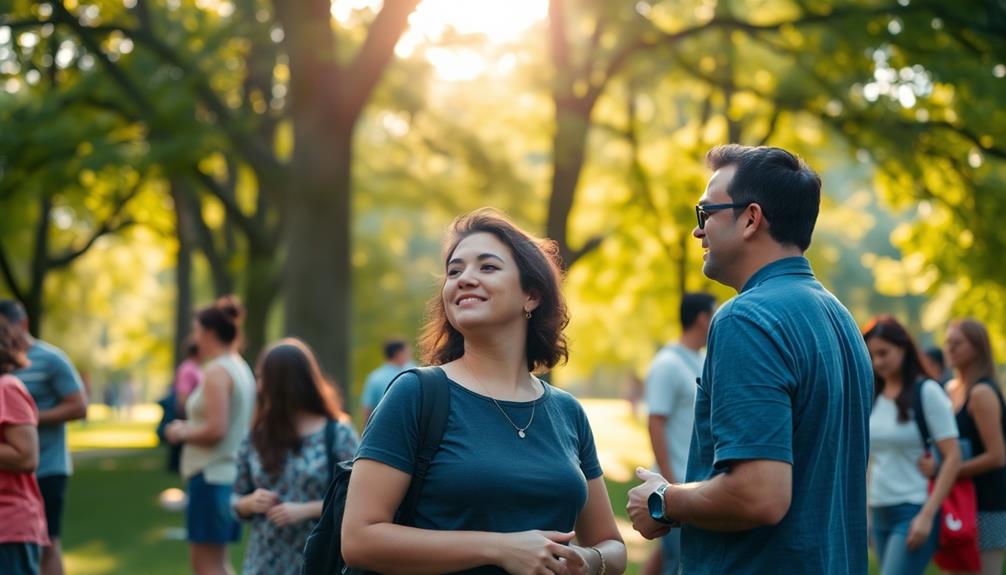
Social anxiety affects millions of adults, making it essential to recognize that you're not alone in feeling uncomfortable in social situations. About 15 million people in the U.S. experience similar feelings.
To overcome social anxiety, start by gradually exposing yourself to social settings. Small gatherings can provide excellent opportunities to talk without overwhelming pressure.
Practice mindfulness techniques like deep breathing or grounding exercises to manage those anxious feelings in the moment.
Remember, it's vital to set realistic expectations for your social interactions. Not every attempt at making friends will lead to an instant connection, and that's perfectly okay. It takes time to build relationships.
To ease your nerves, prepare conversation topics or icebreakers in advance. This preparation can help you feel more confident and ready to engage with others.
Focus on the experience rather than the outcome, allowing yourself to enjoy the process of meeting new people. With patience and practice, you'll find that overcoming social anxiety can lead to meaningful connections and friendships.
Embrace each opportunity to talk, and trust that you're moving in the right direction.
The Power of Active Listening

Active listening is an essential skill that can transform your interactions and strengthen your connections with others. By practicing active listening, you enhance communication and show that you genuinely care about what others have to say.
This approach not only makes you more trustworthy but also fosters empathy, paving the way for deeper conversations.
To become a better active listener, consider these strategies:
- Maintain eye contact and smile: This simple action creates a welcoming environment and encourages openness.
- Ask follow-up questions: Demonstrating genuine interest in someone's thoughts can lead to more meaningful exchanges.
- Reflect on what they say: Summarizing or paraphrasing their words shows that you value their feelings and opinions.
- Use non-verbal cues: Nodding or leaning slightly forward can signal that you're engaged and present in the conversation.
Establishing Healthy Boundaries
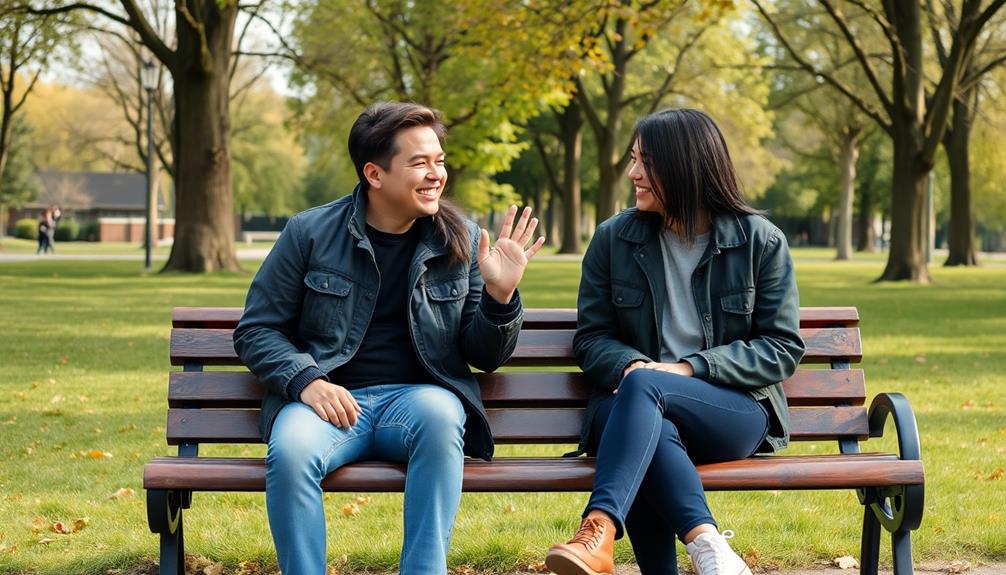
Establishing healthy boundaries is vital for nurturing strong friendships and guaranteeing that both you and your friends feel respected and valued. By clearly communicating your needs and limits, you foster mutual respect, which is the foundation of any meaningful relationship.
Recognize your emotional limits and physical boundaries to avoid burnout. Setting boundaries can include defining how often you want to communicate, what personal information you're comfortable sharing, and how much time you can dedicate to the friendship.
When you're honest about your limits, your friends will appreciate your clarity and will be more likely to respect those boundaries. Regularly reassessing and adjusting boundaries as your friendship evolves is also significant.
This ongoing communication helps confirm both parties feel valued and understood. If something feels off, don't hesitate to bring it up; it can lead to a stronger connection.
Establishing healthy boundaries isn't just about keeping others at a distance; it's about creating a safe space for genuine interaction. So, take the time to communicate your needs, and encourage your friends to do the same. In doing so, you'll cultivate deeper, more fulfilling friendships.
Dealing With Loneliness

Loneliness can feel like a heavy blanket, suffocating and isolating. Acknowledging these feelings is your first step toward overcoming them.
Self-awareness can lead to better coping strategies and emotional resilience. Here are some effective ways to combat loneliness and start making friends:
- Engage in community activities: Join local events or clubs to immerse yourself in social settings.
- Volunteer: Helping others not only distracts you but also strengthens your sense of belonging. Research shows that regular volunteers often feel more connected to their communities.
- Join support groups: Find groups focused on shared interests or experiences. Connecting with others who understand your feelings can greatly alleviate loneliness.
- Practice self-compassion: Nurturing your emotional well-being fosters a sense of belonging within yourself, making it easier to reach out to others.
Understanding the Importance of Connection
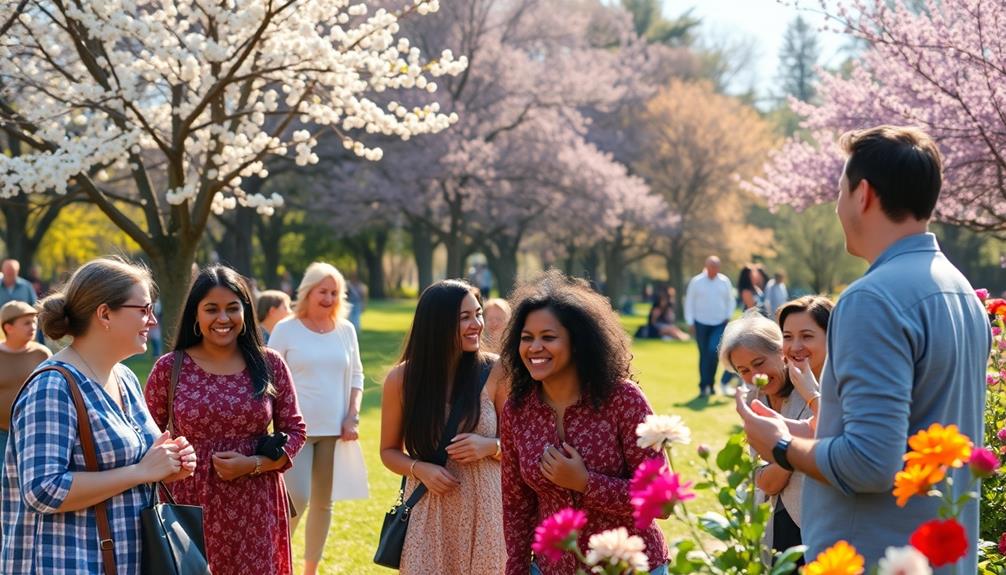
Everyone knows that human connection is essential for our well-being. Building strong relationships isn't just about having good friends; it's about enhancing your mental health.
Studies show that individuals with close friendships experience lower rates of anxiety and depression. When you nurture these connections, you're not only improving your emotional well-being but also boosting your longevity. In fact, people with strong relationships are 50% more likely to live longer.
Having friends provides important emotional support during tough times, helping you build resilience against stress and adversity. This support is critical for maneuvering life's challenges, as it allows you to cope more effectively.
Frequently Asked Questions
What Is the Easiest Way to Make Friends?
The easiest way to make friends is to engage in activities you enjoy. Whether it's joining a club, volunteering, or attending events, being open and approachable helps you connect with others naturally and meaningfully.
How Do People Make New Friends so Easily?
Isn't it funny how effortlessly people make friends? You engage in social activities, engage openly, and listen closely. You'll find that genuine interest and shared experiences turn strangers into friends faster than you think.
How Come I Struggle to Make Friends?
You might struggle to make friends because social opportunities decrease as adults, anxiety holds you back, and you may not actively seek connections. Also, starting conversations can be intimidating, and friendships require time and effort to develop.
How Do You Make Friends in 10 Easy Steps?
To make friends, start by engaging in activities you enjoy, volunteering, and reaching out to others. Be open, ask questions, and listen actively. Remember, building connections takes time, so be patient and persistent.
Conclusion
Making friends doesn't have to be intimidating; it's about taking those small steps that lead to meaningful connections. Remember, every great friendship starts with a simple "hello." By being open, approachable, and genuinely interested in others, you can transform fleeting encounters into lasting bonds. So, why wait? Immerse yourself in the world around you, and watch as friendships blossom. After all, in a world that sometimes feels lonely, isn't it worth it to forge those connections?

